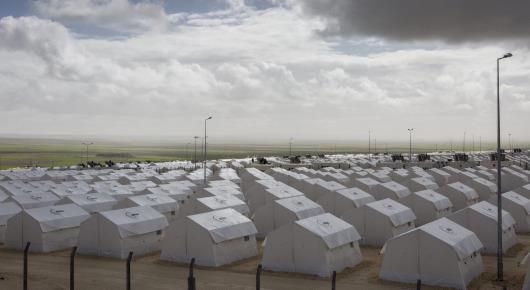Syrian refugees, host communities acquire work skills in agriculture

A new FAO project targets Syrian refugees and host communities in Turkey, for development of vocational skills in the agriculture sector. The aim is to provide employment opportunities for some 900 people in five provinces of Southern Turkey: Adana, Gaziantep, Isparta, Mersin and Sanliurfa.
With a budget of US$ 1.7 million, the project is financed by the United Nations High Commissioner for Refugees (UNHCR), with Turkey’s Ministry of Food, Agriculture and Livestock as lead executing partner and FAO as implementing agency.
“The scale and duration of the Syrian refugee crisis in Turkey clearly indicates a need for a sustainable approach, to improve the livelihoods and food security of the Syrian refugees and the communities that host them,” said FAO Programme Officer Sheikh Ahaduzzaman. “The FAO initiative on vocational training will facilitate employment opportunities in the agricultural labour market, which has a huge potential to absorb skilled labour.”
Turkey hosts the largest number of Syrian refugees of any country in the world. Concentrated in Turkey’s south-eastern Anatolia region, adjacent to the border with Syria, the refugees have few livelihood options. Often they rely on humanitarian assistance, work as casual wage labourers, or adopt severe coping strategies. Many are young people with limited work skills, employed in low-productivity, irregular or seasonal agricultural work in Turkey.
Through vocational training, the project is expected benefit three groups: agricultural producers, refugees and host communities. It aims to improve social cohesion between Syrian refugees and their host communities by creating employment for both groups, increasing household incomes, improving productivity, and raising the quality of agricultural products.
“The agriculture sector emerges as a primary gateway to absorb the labour force of Syrian refugees, for particular reasons,” Ahaduzzaman said. “First and foremost, agriculture has an important role as a major contributor to the local economy in the pilot provinces. The livestock and dairy sectors in particular are growing and experiencing considerable investment—which requires a skilled work force. The provinces where the project will be active are particularly in need.”
Given the similarities between the agricultural landscapes of south-eastern Turkey and neighbouring areas of Syria, many refugees already have some work experience on farms and agricultural enterprises.
For those who have not worked in agriculture before, the FAO project provides an opportunity to acquire skills that are in high demand, and gain hands-on experience to improve their employability.
Vocational training is getting under way now, and will continue through October. The focus will be on livestock care and herd management; cultivation and harvesting of apple, grape, olive, pistachio and cotton; harvesting and post-harvest processes for pepper, citrus and pomegranate; greenhouse vegetable production; and irrigation management, farm management and food hygiene.
A series of workshops designed to prepare a cohort of trainers concluded last week. It covered instructional design, effective presentation and facilitation skills, adult learning principles, training evaluation, identifying and addressing common training problems, best practices for communicating with refugees, FAO’s perspective on each technical topic, and review of the training curriculums.
The project has six main implementing partners operating in different subject areas: Mediterranean Fresh Fruit and Vegetable Businessmen Association, Western Mediterranean Economy Development Foundation, Gaziantep Chamber of Industry, Gaziantep Provincial Directorate of Ministry of Food, Agriculture and Livestock, Sanliurfa Cattle Breeders’ Association and Şanlıurfa Provincial Directorate of Ministry of Food, Agriculture and Livestock.
17 August 2017, Sanliurfa, Turkey
